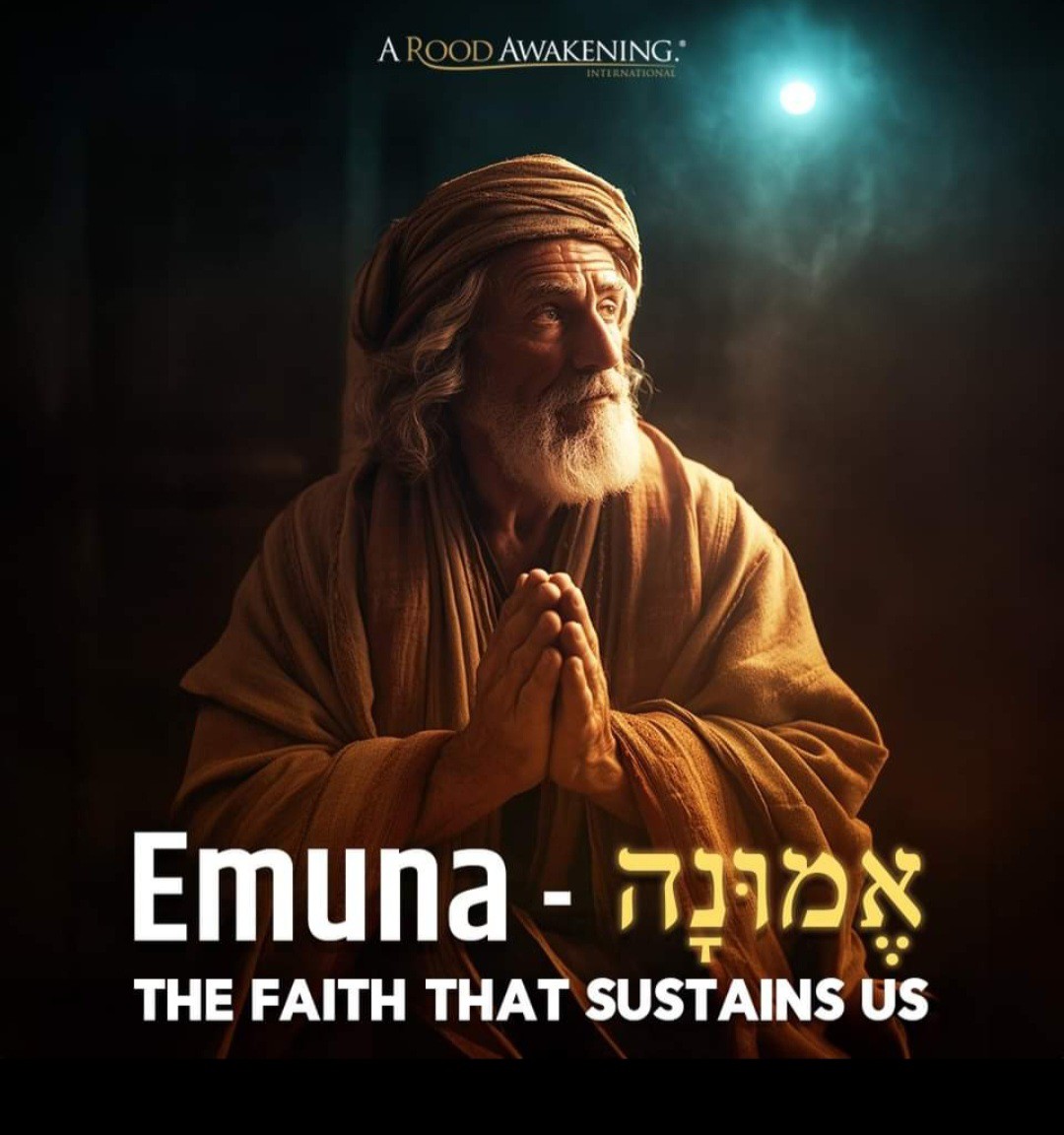Watch
Events
Articles
Market
More
What is faith? Have you ever tried to define it? If we cannot explain what it is, can we claim to possess it?
In the dictionary, this word is associated with belief and hope, and while this is true in Hebrew as well, the meaning of the word emuna (אֶמוּנָה) is much more comprehensive.
The first thing we must understand is that the noun emuna comes from a verb. This verb is aman (אָמַן). Amán means to believe, but it also has several physical or practical implications, as we will see below.
“And he believed in Yehovah, and He accounted it to him for righteousness.”
- Genesis 15:6
The verb “believed” (הֶאֱמִן) here comes from the verb amán (אָמַן). And in the context of the story of Abraham, we see how he was a man of action and received this visitation from Yehovah after he had already left his homeland. His emuna led him to take action.
Emuna is related to truth:
“A faithful witness does not lie, but a false witness will utter lies.”
- Proverbs 14:5
“Open the gates, that the righteous nation which keeps the truth may enter in.”
- Isaiah 26:2
Read the full blog post by clicking here: https://aroodawakening.tv/emuna/




And the earth opened its mouth and swallowed them up, with their households and all the people who belonged to Korah and all their goods.
Numbers 16:32 ESV
Evidently some of Korah's sons did not support his rebellion and so were not considered part of "all the people who belonged" to him, because they lived to write some of the Psalms. Just as Abraham IS the father of those who keep his faith, Korah is NOT the father of those who reject his faithlessness.



BIBLE STUDY LESSON 14
SERIES S --- THE SON OF YHVH
TO WORSHIP YHVH
THE PHARISEE AND THE TAX COLLECTOR
From Matthew 19:1-15; Mark 10:1-16; Luke 18:1-17
Yeshua told the disciples a story one day to show how they must continue to pray without losing hope that YHVH would answer. [A judge in a certain city had no respect for YHVH or man,] Yeshua told them. [But a widow in that city kept coming to that judge, begging him to help protect her from someone. At first, the judge ignored her, but the woman persisted, so the judge finally decided, ‘I have no respect for YHVH or man, but I will help this woman so that she will stop bothering me, for otherwise she will wear me out.’ Now if the unrighteous judge said that, think how YHVH, the righteous Judge, will bring justice for His people who plead with him day and night? Certainly, He will answer their prayers without delay. However, when I return, how many will I find persistently praying?] Yeshua told another parable to illustrate people who think themselves righteous, and look at others with scorn. [Two men went into the temple to pray,] He said. [One was a Pharisee, who thought himself quite righteous. He prayed to himself, ‘YHVH, I thank You that I am not a robber, a cheat, an adulterer or a sinner like that tax collector over there. I fast twice each week and pay tithes of everything I receive.’ The other man was a tax collector, who had probably cheated people. He stood to one side and beat on his chest in repentance and cried out, ‘YHVH have mercy on me, a sinner.’ This cheating, but repentant, tax collector was so ashamed of his sin that he would not even look toward heaven as he prayed, but he, and not the Pharisee, returned home forgiven! Whoever tries to lift himself up in pride shall be humbled, and whoever humbles himself shall be lifted up in honour.] Leaving Galilee, Yeshua went toward Judea, crossing first to the east of the Jordan River. Crowds swarmed around Him as usual and He taught them. Some Pharisees joined the crowds and tried to trap Yeshua with a question about divorce. [Is it lawful for a man to divorce his wife for any reason?] they asked. [Don’t you remember what the Scriptures say about marriage?] Yeshua asked. [It tells us that YHVH made man and woman, and when a man leaves father and mother to marry, he and his wife become one flesh, so they are no longer two, but are one. Man must not separate what YHVH has joined.] [Then why did Moses permit divorce by giving a certificate to a wife and sending her away?] they asked. [Moses did this because of the hardness of hearts,] Yeshua answered. [But it was not YHVH’s plan in the beginning. I tell you also that whoever divorces husband or wife, except for unfaithfulness, and then marries another, commits adultery.] The disciples asked Yeshua about this when they were alone in a house. [If that is the way things are, isn’t it better for people not to marry?] they asked. [Not everyone can accept this,] Yeshua replied. [Only those to whom it is given. Some are born without the ability to unite with a mate, others were made that way by people, and still others refrain from the marriage relationship so they may serve YHVH. Whoever can accept this, let him do it.]
COMMENTARY
WIDOWS
Jewish Law required that people show mercy to a woman whose husband had died. In that way, the Israelites were not like their neighbours, who made no special allowances for widows. Since a woman was totally dependent on her husband for her possessions, food and shelter, Jewish law spelled out very clearly what was to be done for a widow. If the widow had sons, she became their responsibility. If she had none, she could return to her parents, stay with other members of her family, or remain with her husband’s family. She could remarry. Under certain circumstances, she could marry her husband’s brother or his closest male relative; the son of such a union, called a levirate marriage, was considered the dead man’s child. The widow who had little or no income was protected from starvation by Jewish Law. Reapers were commanded to leave grain standing in the corners and edges of the field for the widow to take. A portion of olives and grapes was also left in the orchards and vineyards for her. Every third year, some of the Israelites’ tithe was set aside for the needs of widows. It was forbidden to take a widow’s mourning clothes as security for a loan. Nor could her last ox be taken as payment. But in spite of the Law’s Commandments, the people of Israel did not always show mercy to widows. Often even before her husband was buried, creditors threatened to take away almost everything she owned. If she did not have enough money to pay back her husband’s debts, her house or land could be claimed as payment. If she was so poor that she had nothing, the creditors would take her children as slaves. The Old Testament prophets warned the disobedient Israelites of YHVH’s judgment for their sins, including the bad treatment of widows. Yeshua, too, spoke about the dishonest judge who would not defend the widow until she wore him down with her pleas.



Satan twists good into evil. Fortunately, God takes what Satan meant for evil and turns it to good. Korah and company believed God could be manipulated by his own rules, but they didn't understand his rules. God is a God of order and he follows his own rules, but the rules ALWAYS serve him and his purposes, not our whims.
https://soilfromstone.blogspot.....com/2015/06/korahs-



Happy Thursday! I hope your home is filled with peace and joy today. I've filled today's newsletter with ideas to help in case you're struggling. https://archive.aweber.com/awlist6425868/C5opE




When addressing Biblical topics it is important to maintain Biblical authority and Biblical accuracy. Topics such as marriage, divorce, homosexuality, abortion, political leadership and practically every topic known to mankind is addressed in the Bible. When we attempt to address these topics from our own moral view, we fail miserably. But when we use the sacred word of our Creator to address these things, we use His ultimate authority. Deuteronomy 4:2, “Don’t add to these commands. And don’t leave anything out. But obey the commands of the Lord your God that I give you.” (ICB)



I cannot believe I got a decent picture of the Cresent moon! ??And Elohim called the light ‘day’ and the darkness He called ‘night.’ And there came to be?evening and there came to be morning,?
☝️one day.? ( יוֹם אֶחָד yom echad) The word Echad means one, it is never plural. אֶחָד ('ecḥāḏ). The Aleph (א (אלף means one!
Berĕshith (Genesis) 1:5 TS2009
And Elohim said, “Let an expanse come to be in the midst of the waters, and let it separate the waters from the waters.” And Elohim made the expanse, and separated the waters which were under the expanse from the waters which were above the expanse. And it came to be so. And Elohim called the expanse ‘heavens.’ And there came to be?evening and there came to be morning,?
✌️the second day.? (י֥וֹם שֵׁנִֽי)
Berĕshith (Genesis) 1:6-8 TS2009
And there came to be?evening and there came to be morning,?
?the third day.? (י֥וֹם שְׁלִישִֽׁי)
Berĕshith (Genesis) 1:13 TS2009
?And Elohim said, “Let lights come to be in the expanse of the heavens to separate the day from the night, and let them be for?signs and ?appointed times (moedim), and for days?
and years,?
Berĕshith (Genesis) 1:14 TS2009
And there came to be ?evening and there came to be morning,?
✌️✌️the fourth day.?(י֥וֹם רְבִיעִֽי)
Berĕshith (Genesis) 1:19 TS2009
And there came to be ?evening and there came to be morning,?
?the fifth day.?(י֥וֹם חֲמִישִֽׁי)
Berĕshith (Genesis) 1:23
And Elohim saw all that He had made, and see, it was very good. And there came to be?evening and there came to be morning,?
?☝️the sixth day.?(י֥וֹם הַשִּׁשִּֽׁי)
Berĕshith (Genesis) 1:31 TS2009
?✌️And in the ?seventh day (בַּיּ֣וֹם הַשְּׁבִיעִ֔י)?
Elohim completed His work which He had done, and He rested on the
?seventh day (בַּיּ֣וֹם הַשְּׁבִיעִ֔י)
from all His work which He had made.
?And Elohim blessed ?
?the seventh day (אֶת־י֣וֹם הַשְּׁבִיעִ֔י) and set it apart,?? because on it He rested from all His work which Elohim in creating had made.
Berĕshith (Genesis) 2:2-3 TS2009
?TORAH?Sabbath starts on the 6th day sunset - and ends on 7th day sunset??
(3 Vayevarech Elohim et Yom HaShevi’i, and set it apart as kadosh: because that in it shabbat (He had rested) from all His work which bara Elohim laasot (G-d created) and made.)
וַיְבָ֤רֶךְ אֱלֹהִים֙ אֶת־י֣וֹם הַשְּׁבִיעִ֔י וַיְקַדֵּ֖שׁ אֹת֑וֹ כִּ֣י ב֤וֹ שָׁבַת֙
מִכָּל־מְלַאכְתּ֔וֹ אֲשֶׁר־בָּרָ֥א אֱלֹהִ֖ים לַֽעֲשֽׂוֹת:
The last three words in the story of Creation: “...bara Elōhîm laasot —[He rested from all His work] which G‑d created and made.” The final letters of these three words (אמת),
בָּרָא אֱלֹהִים לַעֲשֽׂוֹת,
spells the word emet (אֶמֶת). Why? Because G‑d’s painting is imbued with His signature of truth.
⚡️?HIS BANNER is TRUTH?⚡️



